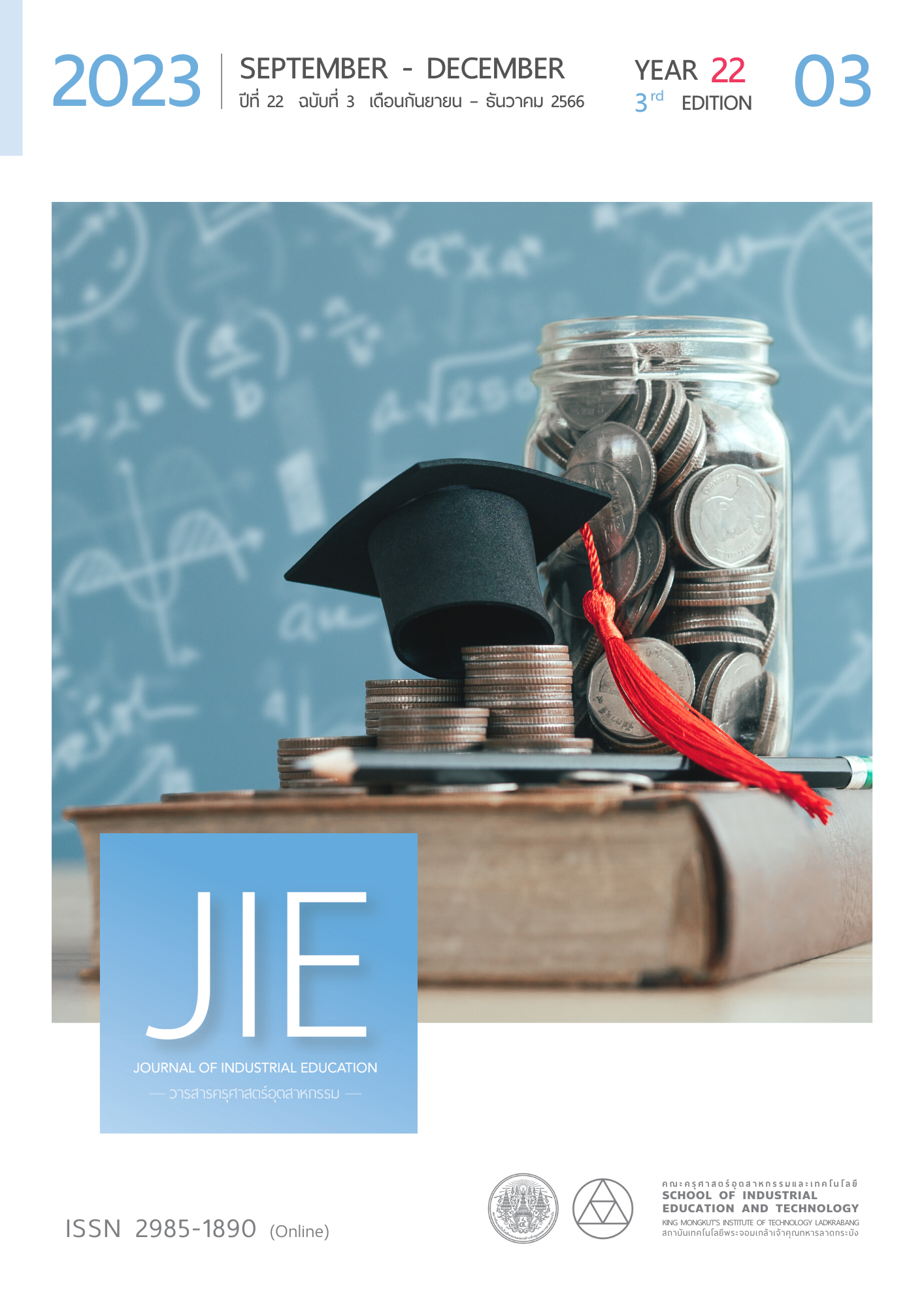THE DEVELOPMENT OF FLIPPED CLASSROOM LEARNING USING PROJECT BASED LEARNING AND EVERYCIRCUIT APPLICATION TO ENHANCE ELECTRICAL CIRCUIT ANALYSIS SKILLS DEPARTMENT OF ELECTRONICS VOCATIONAL CERTIFICATE STUDENTS
Keywords:
Flipped classroom, Project based learning, EveryCircuit application, Electrical circuit analysis skillsAbstract
This research is flipped classroom learning using project based learning and EveryCircuit application. The samples were 20 students from vocational certificate level students, Sri Samrong Industrial and Community Education College who enrolled in the subject Direct Current Circuit, semester 1, academic year 2022 and selected by purposive sampling. The research instruments were 1) a lesson plan of flipped classroom learning using project based learning and EveryCircuit application, 2) a achievement test of flipped classroom learning using project based learning and EveryCircuit application, 3) the assessment of electrical circuit analysis skills, and 4) the assessment of project based learning. Research data were analyzed by using mean (), standard deviation (SD), percentage (%) and test the hypothesis with t-test for dependent-samples. The results of the research were: 1) the quality assessment result of flipped classroom learning using project based learning and EveryCircuit application from five experts was at a high mean value (
= 4.85), with standard deviation (SD) = 0.120. 2) The comparison shows that learners' learning achievement after studying is significantly (.05) higher than before studying. 3) The comparison of learners' electrical circuit analysis skills after studying higher than before study which was significant at .05. 4) The project was evaluated at the highest-level mean value (
= 2.39), accounting for more than 80% of the total.
References
Bloom, B. S. (Ed.). (1956). Taxonomy of educational objectives: The classification of educational goals (Handbook 1). David Mckay.
Boonmee, W. (2021). Teaching materials and learning in the 21st century. Journal of Legal Entity Management and Local Innovation, 7(9), 373-386. (in Thai)
Chabaporn, P. (2019). The 5Es flipped classroom for promoting critical thinking skills and learning achievement on the properties of genetic material and mutation of Grade 12 student [Master’s thesis]. Rajabhat Maha Sarakham University. (in Thai)
Chaosurin, S., Kasemsiri, J., Chewwattana, W., Manipantee, S., & Chuchan, N. (2021). The impact of the Coronavirus disease 2019 (COVID-19) pandemic on children with chronic diseases and guidelines for providing care. Vajira Nursing Journal, 23(2), 97-107. (in Thai)
Intharayut, S., Tansriwong, S., & Koseeyaporn, P. (2016). The development of a computer-based learning and practice program under eclecticism theory for the subject of electric circuit analysis. The Golden Teak: Humanity and Social Science Journal, 22(1), 70-83. (in Thai)
Jitchayawanit, K., Suwanasri, N., Khamkhad, U., Krutmuang, C., & Rojanaiti, S. (2022). Learning management in new normal towards sustainable development. Journal of Modern Learning Development, 7(7), 490-503. (in Thai)
Khlangboonklong, K. (2012). The assisted mother in raising her child and recording the child development web application [Thesis]. King Mongkut's University of Technology Thonburi. (in Thai)
Khotmanee, W., & Trebooniti, K. (2022). a study on online learning achievement with EveryCircuit program: A case study on basic parameter measurement of electrical measurements and instrumentation. Vocational Education Central Region Journal, 6(1), 34-39. (in Thai)
Office of the Vocational Education Commission. (2021). Curriculum for certificate of vocational education in electronic. Author. (in Thai)
Pongsawat, P., & Piriyasurawong, P. (2015). Flipped classroom using project-based Learning. Technical Education Journal King Mongkut’s University of Technology North Bangkok. 6(2), 228-234. (in Thai)
Seels, B., & Glasgow, Z. (1998). Making instructional design decisions (2nd ed.). Merril.
Srihirun, W. (2017). Critical thinking with flipped classroom. Graduate Studies Journal, 13(65), 19-28. (in Thai)
Sajjaboriboon, M. (2018). The Project-Based Learning Model in a Collaborative Flipped Classroom through Social Networks [Master’s Thesis]. King Mongkut’s University of Technology North Bankok. (in Thai)
Thana, T. (2020). Development of analytical thinking ability and academic achievement for vocational certificate students through Project Based Learning (PjBL) of a Basic Microcontroller [Master’s Thesis]. King Mongkut’s University of Technology Thonburi. (in Thai)
Tursina, R., & Muhammad, E. (2017). The Effect of EveryCircuit Simulator to Enhance Motivation and Students Ability in Analyzing Electrical Circuits. In 2nd Asia Education Symposium. (AES 2017). (pp. 399-404). SCITEPRESS. (in Indonesia)
Wattananai, Luksanasakul, A., Koseeyaporn, P., & Wangsanitwong, M. (2010). The study of the academic process problem at the Department of Teacher Training in Electrical Engineering, Faculty of Technical Education, King Mongkut's University of Technology. In P. Koseeyaporn (Ed.), Proceedings of 3rd National Conference on Technical Education “Engineering & Techmical Education” (pp. 736-741). NCTechED. (in Thai)
Worakum, P. (2018). Educational research (9th ed.). Thaksila Printing. (in Thai)
Wittarit, K., & Kantayut, T. (2022). A Study on Online Learning Achievement with EveryCircuit Program : A Case Study on Basic Parameter Measurement of Electrical Measurements an Instrumentation. Vocational Education Central Region Journal, 6(1), 34-39. (in Thai)
Downloads
Published
How to Cite
Issue
Section
License
Copyright (c) 2023 Journal of Industrial Education

This work is licensed under a Creative Commons Attribution-NonCommercial-NoDerivatives 4.0 International License.
"The opinions and contents including the words in papers are responsibility by the authors."
"ข้อคิดเห็น เนื้อหา รวมทั้งการใช้ภาษาในบทความถือเป็นความรับผิดชอบของผู้เขียน"



